|
 Secure Site
Secure Site
|
 |
Archive for the 'Zen Clocks and Dream Recall' Category
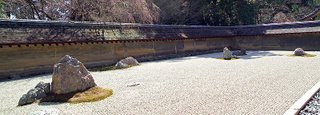 Stone garden in the karesansui style at Ryōan-ji. Karesansui Gardens or “dry landscape” gardens were influenced mainly by Zen Buddhism and can be found at Zen temples of meditation.
In Japanese culture, garden-making is a high art, intimately related to the linked arts of calligraphy and ink painting.
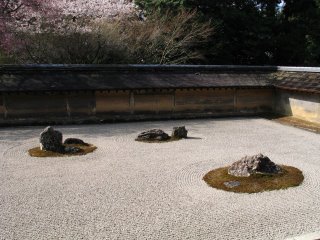 Ryōan-ji Unlike other traditional gardens, there is no water present in Karesansui gardens. However, there is raked gravel or sand that simulates the feeling of water.
The rocks/gravel used are chosen for their artistic shapes, and mosses as well as small shrubs are used to further garnish the Karesansui style (Japanese Lifestyle).
All in all, the rocks and moss are used to represent ponds, islands, boats, seas, rivers, and mountains in an abstract way. Ryoan-ji, temple in Kyoto, has a garden famous for representing this style. Daisen-in, created in 1513, is also particularly renowned.
adapted from wikipedia.org
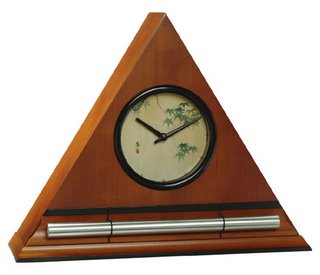 Zen Clocks by Now & Zen, Boulder, CO Now & Zen
1638 Pearl Street
Boulder, CO 80302
(800) 779-6383
Posted in Chime Alarm Clocks, mindfulness practice, Natural Awakening, Now & Zen Alarm Clocks, Zen Clocks and Dream Recall, Zen Timers
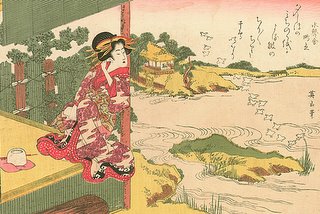 zen garden from tea house, Eizan (1787-1867), Noda River Ukiyo-e Often thought of as tranquil sanctuaries that allow individuals to escape from the stresses of daily life, Japanese gardens are designed for a variety of purposes. Some gardens invite quiet contemplation, but may have also been intended for recreation, the display of rare plant specimens, or the exhibition of unusual rocks.
adapted from wikipedia.org
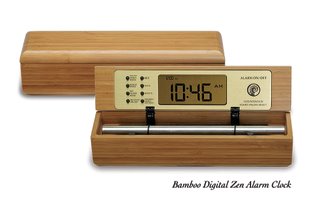 Bamboo Alarm Clocks & Meditation Timers Now & Zen
1638 Pearl Street
Boulder, CO 80302
Posted in Chime Alarm Clocks, Japanese Inspired Zen Clocks, Now & Zen Alarm Clocks, Progressive Awakening, Zen Clocks and Dream Recall, Zen Timers
 Early Morning Grogginess Reduced by Gradual Awakening - Ukiyo-e Print by Kitagawa Utamaro Boulder, Colorado—an innovative company has taken one of life’s most unpleasant experiences (being startled awake by your alarm clock early Monday morning), and transformed it into something to actually look forward to. “The Zen Alarm Clock,” uses soothing acoustic chimes that awaken users gently and gradually, making waking up a real pleasure.
Rather than an artificial recorded sound played through a speaker, The Zen Clock features an alloy chime bar similar to a wind chime. When the clock’s alarm is triggered, its chime produces a long-resonating, beautiful acoustic tone reminiscent of a temple gong. Then, as the ring tone gradually fades away, the clock remains silent until it automatically strikes again three minutes later. The frequency of the chime strikes gradually increase over ten-minutes, eventually striking every five seconds, so they are guaranteed to wake up even the heaviest sleeper. This gentle, ten-minute “progressive awakening” leaves users feeling less groggy, and even helps with dream recall.
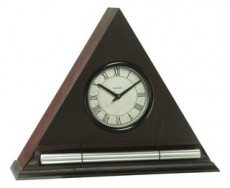 Dark Oak Zen Alarm Clock with Chime What makes this gentle awakening experience so exquisite is the sound of the natural acoustic chime, which has been tuned to produce the same tones as the tuning forks used by musical therapists. According to the product’s inventor, Steve McIntosh, “once you experience this way of being gradually awakened with beautiful acoustic tones, no other alarm clock will ever do.”
Zen Alarm Clocks, made by Now & Zen, Inc., come in a variety of shapes and sizes. Now & Zen’s complete line of natural lifestyle products can be seen at: (www.now-zen.com), or by calling the company at (800) 779-6383 to request a catalog.
 The Gradual Chime Alarm Clock Store Now & Zen – The Gradual Chime Alarm Clock Store
1638 Pearl Street
Boulder, CO 80302
(800) 779-6383
Posted in Chime Alarm Clocks, Natural Awakening, Now & Zen Alarm Clocks, Progressive Awakening, Sleep Habits, Zen Clocks and Dream Recall
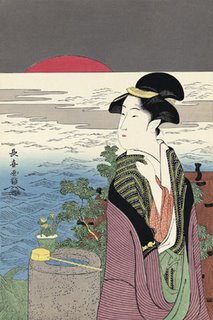 Choki Eishosai, Sunrise at New Year It’s hard to learn from your dreams if you can’t remember them. But even if you draw a blank every morning, don’t fret. Follow these steps, recommended by Deirdre Barrett, PhD, assistant professor of psychology at Harvard Medical School, and Andrew Holecek, a dream workshop teacher at Colorado’s Shambhala Mountain Center, to enhance your dream recall.
- Get seven to eight hours of sleep a night. The more you sleep, the more dreams you will have, increasing the likelihood you’ll remember one of them.
- Throughout the day and right before you fall asleep, remind yourself of your intention to remember your dreams.
- Keep a pen and paper by your bed. A dream journal can encourage recall and, at the very least, help you document any fragment you do remember upon waking.
- When you first wake up, don’t move. Lie quietly and reflect on any image that comes to mind. Sometimes a whole dream scenario will come back to you.
- Be mindful during the day, not just about dreams but about everything going on around you. The lucidity you cultivate in waking life will translate to your dream life.
- Set the Zen Alarm Clock to wake you every two hours throughout the night. When the chimming alarm sounds, write down as much as you can remember about the dream you were just having.
Boulder, Colorado—an innovative company has taken one of life’s most unpleasant experiences (being startled awake by your alarm clock early Monday morning), and transformed it into something to actually look forward to. “The Zen Alarm Clock,” uses soothing acoustic chimes that awaken users gently and gradually, making waking up a real pleasure. Rather than an artificial recorded sound played through a speaker, the Zen Clock features an alloy chime bar similar to a wind chime. When the clock’s alarm is triggered, its chime produces a long-resonating, beautiful acoustic tone reminiscent of a temple gong. Then, as the ring tone gradually fades away, the clock remains silent until it automatically strikes again three minutes later. The frequency of the chime strikes gradually increase over ten-minutes, eventually striking every five seconds, so they are guaranteed to wake up even the heaviest sleeper. This gentle, ten-minute “progressive awakening” leaves users feeling less groggy, and even helps with dream recall.
Now & Zen’s Chime Alarm Clock Store
1638 Pearl Street
Boulder, CO 80302
(800) 779-6383
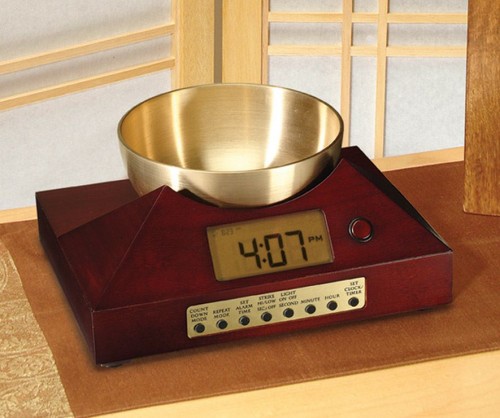 Zen Timepiece, an alarm clock to wake you from napping with Tibetan bowl/gong
Posted in Bamboo Chime Clocks, Chime Alarm Clocks, Japanese Inspired Zen Clocks, mindfulness practice, Natural Awakening, Now & Zen Alarm Clocks, Progressive Awakening, Sleep Habits, Ukiyo-e, Well-being, Zen Clocks and Dream Recall
 Pierre-Cécile Puvis de Chavannes: The Dream, 1883
Sleep Type: The Human Alarm Clock
You crash as soon as your head hits the pillow, but wake like clockwork at 2, 3, or 4 a.m.
What’s Going On?
“We all wake up briefly — two to three dozen times a night — without awareness or memory,” says Paul Glovinsky, Ph.D., coauthor of “The Insomnia Answer.” If you’re all too aware of your awakenings, a number of things may be going on. Simple conditioning, a la Pavlov’s dogs, could be to blame. Your body can be “on the lookout for that awakening, especially if there’s a clock in the bedroom,” Glovinksy says. Also consider stress: You may fall asleep out of pure exhaustion, but as soon as your sleep needs are slightly quenched, anxieties wake you up again. For some people, says Rubin Naiman, Ph.D., director of Sleep Programs at Miraval Resort, the body’s inner clock, or circadian rhythms, may be malfunctioning
What to Do
Whatever’s behind your awakenings, hiding your neon time reminder is step one. This would be the perfect time to get the Zen Alarm Clock in the Digital style (so you could close the lid) or the original style without the light. If you can’t see the clock, you won’t panic as you calculate how many hours remain until daybreak — and how little you’ve slept. “Put it on the floor or close the cover to the Zen Clock,” says Joyce Walsleben, R.N., Ph.D., associate professor of medicine at New York University. “When the alarm chimes, you can get up, but otherwise, you’re in bed to sleep.” For many people, this simple shift alone reconditions their brain.
Boulder, Colorado—an innovative company has taken one of life’s most unpleasant experiences (being startled awake by your alarm clock early Monday morning), and transformed it into something to actually look forward to. “The Zen Alarm Clock,” uses soothing acoustic chimes that awaken users gently and gradually, making waking up a real pleasure.
What makes this gentle awakening experience so exquisite is the sound of the natural acoustic chime, which has been tuned to produce the same tones as the tuning forks used by musical therapists. According to the product’s inventor, Steve McIntosh, “once you experience this way of being gradually awakened with beautiful acoustic tones, no other alarm clock will ever do.”
adapted from Body + Soul, May 2008 by Sarah Schmelling
 Alarm Clocks for a Progressive Awakening, Zen Clocks in Digital Styles Now & Zen – The Most Gentle Alarm Clocks with Chimes
Visit Our Shop
1638 Pearl Street
Boulder, CO 80302
Posted in Bamboo Chime Clocks, Goodness, Japanese Inspired Zen Clocks, Meditation Timers, Meditation Tools, mindfulness practice, Natural Awakening, Progressive Awakening, Sleep Habits, Well-being, Zen Clocks and Dream Recall
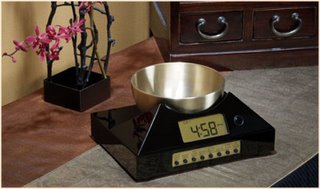 Zen Timepiece, tibetan singing bowl timer and clock Singing bowls (also known as Himalayan bowls, rin gongs, medicine bowls, Tibetan bowls or suzu gongs in Japan) are a type of bell, specifically classified as a standing bell. Rather than hanging inverted or attached to a handle, standing bells sit with the bottom surface resting. The sides and rim of singing bowls vibrate to produce sound.
Singing bowls were traditionally used throughout Asia as part of Bon and Tantric Buddhist Sadhana. Today they are employed worldwide both within and without these spiritual traditions, for meditation, trance-induction, relaxation, healthcare, personal well-being and religious practice.
Singing bowls were historically made in Tibet, India, Nepal, Bhutan, China, Japan, and Korea. Today they are made in Nepal, India, Japan and Korea. The best known type are from the Himalayan region and are often termed Tibetan singing bowls.
Our Zen Timepiece’s acoustic 6-inch brass bowl-gong clock is the world’s ultimate alarm clock, practice timer, and “mindfulness bell.”
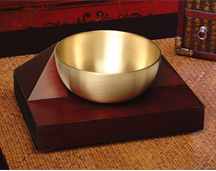 Singing Bowl Alarm Clocks - Never Hit Your Snooze Button Again It fills your environment with beautifully complex tones whenever it strikes. In the morning, its exquisite sounds summon your consciousness into awakening with a series of subtle gongs that provide an elegant beginning to your day. Once you experience the Zen Timepiece’s progressive awakening, you’ll never want to wake up any other way. It also serves as the perfect meditation timer. Available in 5 wood styles, including bamboo.
adapted from wikipedia.org
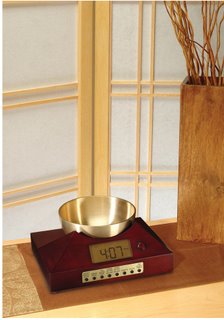 Zen Timepiece, a bowl/gong alarm clock and timer in cherry finish Now & Zen’s Singing Bowl Clock Store
1638 Pearl Street
Boulder, CO 80302
(800) 779-6383
Posted in Chime Alarm Clocks, Japanese Inspired Zen Clocks, Well-being, Yoga Timer, Yoga Timers by Now & Zen, Zen Clocks and Dream Recall, Zen Timepiece by Now & Zen, Zen Timers
 Dream Recall
The Digital Zen Alarm Clock can help you remember and use your dreams in two basic ways: First, by not abruptly interrupting your dreams and allowing your dreaming mind to “finish the dream;” and secondly, by giving you the time between chimes to lie in bed undisturbed when you are first awakened, so you can recall your dreams. Depending on how deeply you are sleeping when the clock’s alarm is triggered, it may take several chimes of the Digital Zen Alarm Clock to arouse you from a dreaming state, or you may be awakened by the first chime. But even if the first chime does wake you, it is possible to resume or re-enter a dream from which you are marginally awakened if you are allowed to return to the dream without further disturbance. The interval between the first and second chimes can provide a period of time for you to reach a cathartic conclusion to your dream. Preventing the abrupt interruption of your dreams acts to preserve your dream experiences, and maximizes the psychic benefits to be derived from improved memory of your dreams.
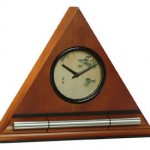 Zen Clocks by Now & Zen There is general agreement among dream researchers that “natural” awakening (as opposed to using a clock radio or buzzer alarm) aids in dream retention and understanding. The Digital Zen Alarm Clock comes closer to providing a natural awakening than practically any other wake-up aid. For best results, as you are falling asleep at night, resolve that your first thought upon waking will be the recollection of your dream. Whether or not you are in the middle of a dream when the chime wakes you, your best dream memories will be available in your first moments of waking consciousness.
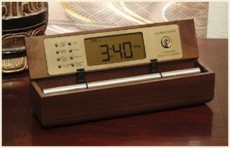 Digital Zen Alarm Clock
Before opening your eyes or moving, lie quietly and try to remember your dream. Recall the sequence of events and the most vivid images. When you have a conscious memory of your dream, you are ready to open your eyes and get up. Keeping a notebook by your bed to write down your dream memories can also be helpful. Discovering the value of your dream life can be richly rewarding.
Posted in Natural Awakening, Now & Zen Alarm Clocks, Progressive Awakening, Zen Clocks and Dream Recall
 Gong Timer - Boost Your Short-Term Memory - Utagawa Toyokuni Ukiyo-e Woodblock A certain type of meditation may help the brain retain images for short periods, says a new study on visual-spatial abilities.
When people view an object, they usually retain a clear picture of it in their visual short-term memory for only a few seconds before the details fade. An experiment by George Mason University researchers, though, found that people who practice Deity Yoga (DY) do much better at visual-spatial tasks shortly after they meditate.
The study’s authors, writing in a recent issue of Psychological Science, said the finding may have “many implications for therapy, treatment of memory loss and mental training.”
Practitioners of DY meditation zero in on an image of their deity, conjuring up a vivid, three-dimensional mental picture of it while honing in on the deity’s emotions and environment.
In the experiment, led by psychologist Maria Kozhevnikov, meditation and non-meditation practitioners performed two visual-spatial tests: imagining the rotation of a 3-D object and viewing an image, then trying to identify it from among several other similar images. After a first round of tests, the participants spent the next 20 minutes either meditating or performing non-meditative tasks before being tested again.
All the subjects had similar scores on the first round of tests, suggesting that meditating in general causes no overall, long-term improvement in visual-spatial skills.
However, those who performed DY meditation between rounds did much better on both tasks in the second phase of tests than those who did non-meditative activities or practiced Open Presence (OP) meditation. OP practitioners, rather than focusing on a specific thing, try to achieve awareness by contemplating a wider array of experiences, images or thoughts that may come to them.
 Gong Timer Can Help Boost Your Short-Term Memory if You Use it to Meditate The study authors concluded that further investigations should be done to see if other visual meditation techniques can produce similar improvements in visual-spatial memory or if the results are specific to DY meditation.
More information
The National Center for Complementary and Alternative Medicine has more about the health benefits of meditation.
SOURCE: Association for Psychological Science, news release, April 27, 2009
“Mindfulness” is the spiritual practice of being aware of your present moment. World famous Zen monk Thich Nhat Hanh has developed the use of a bowl-gong in a practice he calls the “mindfulness bell.” When you hear the sound of the mindfulness bell, you are invited to take a moment to breathe in and out and center yourself in the present. This practice allows the sound of the bowl-gong to periodically connect you to the peace and tranquility that resides inside you right now. This delightful practice reduces stress and improves your overall health.
Our Zen Timepiece’s acoustic 6-inch brass bowl-gong clock is the world’s ultimate alarm clock, practice timer, and “mindfulness bell.”
It fills your environment with beautifully complex tones whenever it strikes. In the morning, its exquisite sounds summon your consciousness into awakening with a series of subtle gongs that provide an elegant beginning to your day. Once you experience the Zen Timepiece’s progressive awakening, you’ll never want to wake up any other way. It also serves as the perfect meditation timer. Available in 5 wood styles, including bamboo (shown).
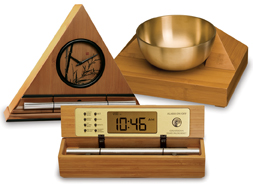 Gong Timers from Now & Zen - Boulder, Colorado Now & Zen – The Gong Timer Store
Downtown Boulder
1638 Pearl Street
Boulder, CO 80302
(800) 779-6383
Posted in Zen Clocks and Dream Recall, Zen Timers
 Snow print by Suzuki Harunobu It’s snowing heavily, and everyone in the backyard is in a swimsuit, at some kind of party: Mom, Dad, the high school principal, there’s even an ex-girlfriend. And is that Elvis, over by the piñata?
Uh-oh.
Dreams are so rich and have such an authentic feeling that scientists have long assumed they must have a crucial psychological purpose. To Freud, when dreaming provided a playground for the unconscious mind; to Jung, it was a stage where the psyche’s archetypes acted out primal themes. Newer theories hold that dreams help the brain to consolidate emotional memories or to work though current problems, like divorce and work frustrations.
Yet what if when dreaming isn’t psychological at all?
In a paper published last month in the journal Nature Reviews Neuroscience, Dr. J. Allan Hobson, a psychiatrist and longtime sleep researcher at Harvard, argues that the main function of rapid-eye-movement sleep, or REM, when dreaming occurs, is physiological. The brain is warming its circuits, anticipating the sights and sounds and emotions of waking.
“It helps explain a lot of things, like why people forget so many dreams,” Dr. Hobson said in an interview. “It’s like jogging; the body doesn’t remember every step, but it knows it has exercised. It has been tuned up. It’s the same idea here: dreams are tuning the mind for conscious awareness.”
Drawing on work of his own and others, Dr. Hobson argues that when dreaming is a parallel state of consciousness that is continually running but normally suppressed during waking. The idea is a prominent example of how neuroscience is altering assumptions about everyday (or every-night) brain functions.
adapted from The New York Times, November 2009 by Benedict Carey
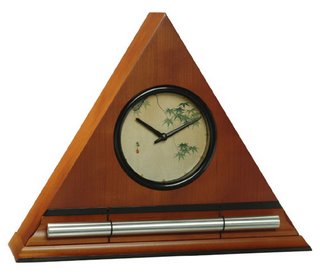 Honey Japanese Maple Leaves Zen Alarm Clock, calming alarm clock useful for remembering one's dreams Now & Zen
1638 Pearl Street
Boulder, CO 80302
Posted in Chime Alarm Clocks, Japanese Inspired Zen Clocks, Natural Awakening, Now & Zen Alarm Clocks, Progressive Awakening, Sleep Habits, Ukiyo-e, Zen Clocks and Dream Recall
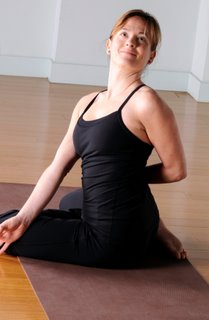 yoga There is one yogic breathing technique that can be practiced at all times of the day and night by just about anyone. This pranayama (breath control) is called ujjayi.
Ujjayi means “victorious.” The prefix ud means upward and superior, and jaya (from root ji) means to conquer and have victory over. With consistent practice of ujjayi breath, a practitioner will attain victorious results for both body and mind.
The benefits of ujjayi breath are manifold. In addition to aerating the lungs and removing excess phlegm, it boosts endurance and gently warms the body. This soothing breath massages and tones the entire nervous system, making it an excellent way to combat stress. It’s also believed to help counter high blood pressure.
While one should initially learn ujjayi breath in a seated position, in can later be consistently threaded through the entire asana practice.
Here’s how to practice:
1. Sit in a comfortable, upright meditation position (I encourage sitting on a folded blanket or pillow for extra support)
2. Maintaining a tall spine, close eyes and begin to breath normally through both nostrils. Observe the flow of the air in and out of the body.
3. Once you’re familiar with the course of the breath, take a deep, slow breath in through the nostrils. Try to focus the air in on the palate and back of the throat and create a sibilant sound (saaaa). It should be an ocean like sound, or like having your ear against a conch shell. Fill the lungs entirely and then…
4. Breath out slowly, focusing the air on the back of the throat/palate.
The sea-like sound is caused by a subtle constriction of the glottis, which is the aperture of the larynx.
The breath should be just loud enough that someone sitting close to you would hear it. Avoid being too loud of forceful. I’m fond of esteemed Ashtanga teacher Tim Miller’s description of ujjayi, “Imagine sipping the breath in through a straw. If the suction is too strong the straw collapses and great force is required to suck anything through it.”
5. Set your Zen Timer with Tibetan Bowl for 15 minutes. Continue to breathe for 5 to 15 minutes with this ocean like sound. If possible, take a brief savasana after.
More experienced practitioners, commit to carrying ujjayi breath through your entire asana practice. Let it be metronomic in quality.
Observe how much space you’ll discover in body and mind!
Sophie Herbert is an alignment focused yoga teacher (and perpetual student), a singer-songwriter, and a visual artist. She has lived, studied, and volunteered extensively in India; teaches yoga in Brooklyn and Manhattan; and recently released her first full-length album, “Take a Clear Look.” Please visit her website at SophieHerbert.com.
adapted from Wholeliving.com February 2011
Use our unique “Zen Clock” which functions as a Yoga Timer. It features a long-resonating acoustic chime that brings your meditation or yoga session to a gradual close, preserving the environment of stillness while also acting as an effective time signal. Our Yoga Timer & Clock can be programmed to chime at the end of the meditation or yoga session or periodically throughout the session as a kind of sonic yantra. The beauty and functionality of the Zen Clock/Timer makes it a meditation tool that can actually help you “make time” for meditation in your life. Bring yourself back to balance.
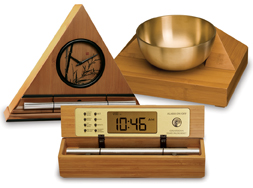 The Zen Timer and Clock Store - Boulder, Colorado Now & Zen – The Zen Timer Store
1638 Pearl Street
Boulder, CO 80302
(800) 779-6383
Posted in Chime Alarm Clocks, yoga, Yoga Timer, Yoga Timers by Now & Zen, zen, Zen Alarm Clock, Zen Clocks and Dream Recall, Zen Timers
« Previous Entries
Next Page »
|
|
|
|